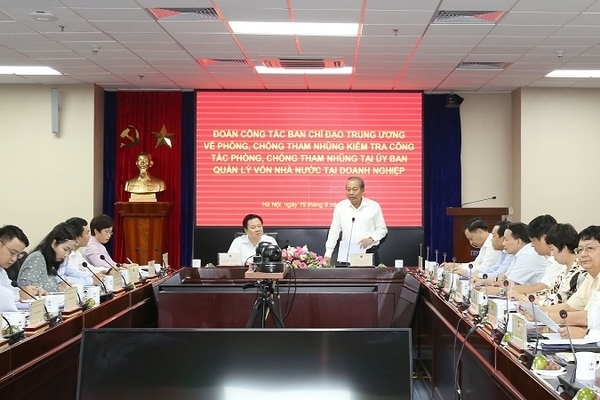 |
|
Deputy PM Truong Hoa Binh speaking at a meeting with the Committee for Management of State Capital (Photo: VGP)
|
Deputy Prime Minister Truong Hoa Binh worked with the Committee for Management of State Capital at Enterprises (CMSC) on September 19 to inspect corruption prevention work at its Party committee.
Speaking at the meeting, Deputy PM Binh stated that the inspection is a regular activity and that state-owned enterprises (SOEs) under the CMSC are all key enterprises, operating in areas such as power, oil, aviation and food.
Deputy PM Binh noted that the CMSC needs to step up its supervision to ensure that the representation of state capital is exercised effectively and regularly take anti-corruption measures within its management authority.
He added that the committee needs to manage state capital strictly while creating the conditions for enterprises to enhance their business performance.
Through the inspection, the Deputy PM, along with the CMSC, wished to review and evaluate its corruption prevention work, promote the good points, and seek solutions to difficulties so as to enhance corruption prevention work at the committee.
Law on judicial expertise needs amendments
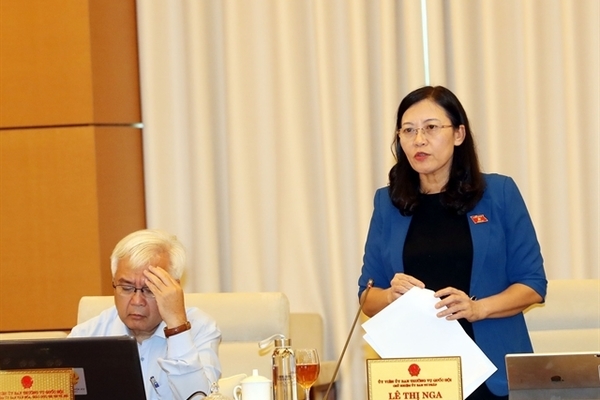 |
|
Lê Thị Nga, chairwoman of the NA’s Judicial Committee at the meeting.
|
Investigations into child sexual harassment cases face hindrances in examination work, said a National Assembly (NA) deputy.
While discussing the amended law on judicial expertise on Thursday, chairwoman of the NA's Ombudsman Committee Nguyễn Thanh Hải said in cases of child sexual harassment or if there are signs of sexual harassment, the victim’s relatives must report the case to police. Within seven days after receiving the report, the police will decide whether to conduct an investigation.
However, the deputy said that seven days is too long and lawmakers need to make amendments to the regulation to protect the victims.
Vice chairman of NA’s Committee of Social Affairs Đặng Thuần Phong said there are no legal documents which recognise results of forensic tests in sexual harassment cases following requests of the victims’ families. If the case is found too late or left unsolved for a long time or the victims are threatened, there are no forensic tests. The important evidence is lost, allowing criminals to avoid prosecution.
The NA deputies agreed it was necessary to make amendments to the Law on Judicial Expertise which was adopted seven years ago. The law’s amendments aim to address current shortcomings to implement the strategy of judicial reform by 2020 and improve the efficiency of the judicial expertise in addressing corruption cases and economic violations.
Lê Thị Nga, chairwoman of the NA’s Judicial Committee told the NA Standing Committee’s meeting on Thursday that the shortcomings of the current judicial examination work is “mostly awareness and law implementation, especially from ministries, sectors and localities.”
The committee’s supervision outcomes show the shortcomings are mostly in economic and corruption cases in construction, banking, finance, natural resources and environment.
NA Chairwoman Nguyễn Thị Kim Ngân said the shortcomings are in the implementation of the law, not the law itself, asking the lawmakers to clarify the law’s shortcomings to make proper amendments.
Vietnam, Thailand hold defence policy dialogue
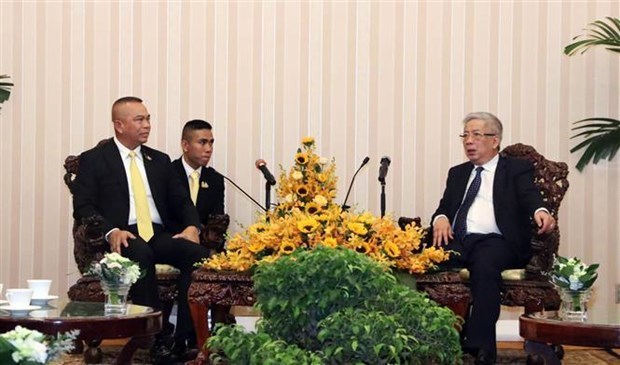 |
|
Vietnam’s Deputy Defence Minister Nguyen Chi Vinh (R) and Thailand’s Permanent Secretary of Defence Natt Intracharoen at the dialogue
|
The third Vietnam-Thailand defence policy dialogue took place in Ho Chi Minh City on September 19 under the chair of Vietnam’s Deputy Defence Minister Nguyen Chi Vinh and Thailand’s Permanent Secretary of Defence Natt Intracharoen.
Deputy Minister Vinh affirmed that Vietnam always attaches importance to its defence cooperation with Thailand as a development partner in the Association of Southeast Asian Nations (ASEAN).
Vinh congratulated the Thai defence ministry for successfully organizing defence-related meetings during 2019, the year Thailand serves as the Chair of ASEAN, and asked the Thai side to help the Vietnamese defence ministry with hosting defence-related meetings in 2020, when Vietnam takes up the chair of the regional bloc.
Natt Intracharoen pledged support for the Vietnamese defence ministry, and affirmed that Thailand always wants to strengthen its defence partnership with Vietnam, contributing to promoting the bilateral cooperation between the two countries, and to ensuring security, peace and development of both countries as well as the region.
The two sides discussed in depth regional and international security issues which affect the security of each country and cooperation in the AESEAN Community as well as in the region and the world. Some of them involved the competition among powerful countries, sea security, non-traditional challenges such as terrorism and trans-national crime.
They shared the view that the partnership between the two defence ministries continued to develop and produce practical results over the past time, and concurred that the two sides will focus their cooperation on the exchange of delegations and young officers, United Nations peacekeeping activities, humanitarian mine action, anti-terrorism fight, and joint work among military forces in the time ahead.
The two sides also agreed to reinforce the collaboration between their marine forces, intensify the fight against trans-national crime and support each other’s initiatives.
The Vietnam-Thailand defence policy dialogue is an annual mechanism for the two countries to discuss and reach agreement on strategic issues and set the direction for bilateral defence cooperation, which is one of the important pillars of the two countries’ relations.
PM highlights aspiration for growth at Reform and Development Forum
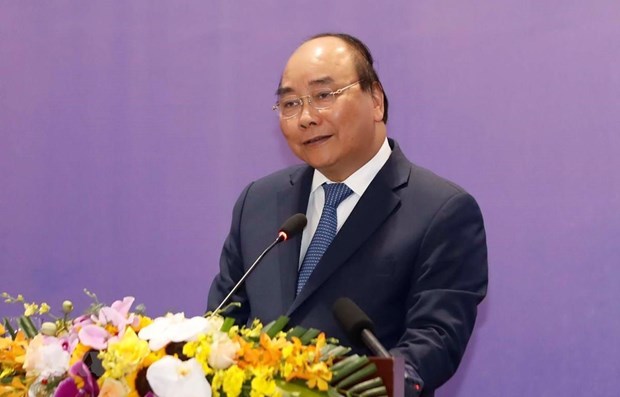 |
|
Prime Minister Nguyen Xuan Phuc speaks at the forum
|
Prime Minister Nguyen Xuan Phuc emphasised Vietnam’s aspiration to develop a strong economy in his speech at a plenary session of the Vietnam Reform and Development Forum (VRDF) 2019 in Hanoi on September 19.
Speaking to policy makers, development partners and domestic and foreign experts at the forum, the PM underlined that over the past 30 years of reform, Vietnam’s economy has achieved high growth, which is the foundation for the country to bring the poverty rate from a high level of over 53 percent in 1992 down to a mere 5.23 percent in 2018.
The middle class has expanded, accounting for more than 15 percent of the population, and is still growing rapidly.
At the same time, the PM agreed with international experts’ assessment about limitations, shortcomings and hidden risks of the Vietnamese economy. Vietnam's resilience and adaptation to external impacts remain weak and its capacity to access the digital economy is still limited.
Recently, the gross domestic product (GDP) growth has been sluggish while the risk of falling into the middle income trap and falling behind remains high, he said.
In 2018, Vietnam ranked third in the Association of Southeast Asian Nations (ASEAN) in terms of population but only sixth in economic size. The country’s participation in the global value chains remains limited, the PM added.
Vietnam hopes for active support from the international community to address the aforesaid restrictions, he said.
He went on to say that Vietnam is working on a development strategy for 2021-2030 amid unpredictable global developments, especially trade war, protectionism, and climate change.
In such context, Vietnam needs to maintain a peaceful environment along with political and social stability for rapid and sustainable development, he said.
According to the government leader, the country has been implementing three strategic breakthroughs which are improving the institutional system, developing the infrastructure network, and promoting human resources.
He stressed that Vietnam aims to develop a dynamic and creative private sector, and making businesses the centre and the momentum of development.
He affirmed that Vietnam will continuously make stronger investment in education as well as build an independent, self-reliant and highly adaptable economy, and implement sustainable development goals 2030 to bring prosperity for people with no one left behind.
At the same time, Vietnam will focus on expanding external relations and international integration while implementing effectively the signed free trade agreements and joining global value chains, he said.
He highly appreciated experts’ constructive opinions and policy ideas to improve the institutional system in Vietnam, saying these recommendations will help the country better its policy making.
The VRDF this year was organised earlier than the previous year’s event with the aim of collecting opinions from domestic and international experts for the building of a socio-economic development strategy in 2021-2030, as well as orientations and tasks for the five-year socio-economic development plan in 2021-2025, which will be submitted to the 11th meeting of the 12th Party Central Committee in October this year.
The topics for discussion at the VRDF 2019 will be more inclusive, covering the reform of the market economy institution, innovation to overcome the middle income trap in the era of Industry 4.0, and priorities and actions to build a prosperous Vietnam.
Deputy PM: Vietnam wants to follow RoK’s cashless model
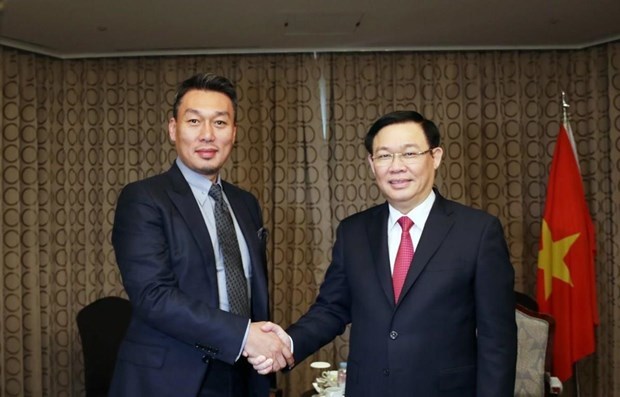 |
|
Deputy Prime Minister Vuong Dinh Hue (R) and Director of the RoK’s Alliex Technology Company Park Byounggun
|
Deputy Prime Minister Vuong Dinh Hue hailed the Republic of Korea as a cashless payment model that Vietnam wants to follow during a reception in Hanoi on September 19 for Director of the RoK’s Alliex Technology Company Park Byounggun.
Hue said Vietnam is embarking on the cashless payment project, with a focus on standardising payment via QR codes and improving infrastructure for common points of sale (POS).
According to him, the Vietnamese government has issued regulations on electronic bills, payment via cards and is striving to enable online payment for public services.
The Deputy PM said the government has directed the pilot application of new technologies in the field and wished that Alliex would work closely with the State Bank of Vietnam to develop a cashless ecological system in the country.
Park informed his host that during his visit, Alliex signed a contract with Vietnam’s Vietinbank and Sacombank to build infrastructure for common POS, contributing to realising the country’s cashless payment policy.
During the first Vietnam – RoK dialogue on economic cooperation at the deputy prime ministerial level in June, Alliex expressed its interest in investing in common POS in Vietnam to help with the development of the sharing and cashless economy.
The company said it intends to pour 700 million USD in Vietnam in the next five years to develop common POS, or nearly 600,000 card payment equipment for the market.
First-class Labour Order presented to outgoing Lao Ambassador
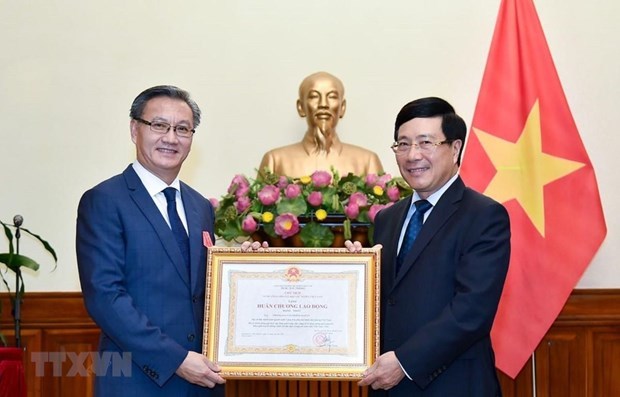 |
|
Deputy Prime Minister and Foreign Minister Pham Binh Minh (R) and Lao Ambassador to Vietnam Thongsavanh Phomvihane
|
Deputy Prime Minister and Foreign Minister Pham Binh Minh presented Labour Order, first class, to outgoing Lao Ambassador to Vietnam Thongsavanh Phomvihane in Hanoi on September 19.
At a reception earlier, Minh lauded the diplomat for his efforts over the past nearly four years in Vietnam, contributing to fostering Vietnam – Laos friendship and special relationship.
He said during the tenure, ties between the two countries’ ministries, agencies and localities have been expanded while links across politics, security, national defence, economy, trade, investment, culture, education, territorial border and consular works have progressed.
Phomvihane, for his part, affirmed that the Lao Party, State and government always strive to reinforce bilateral special and long-standing friendship.
He pledged that in any position, he will continue making active contributions to special solidarity and comprehensive partnership between Vietnam and Laos upon returning home.
39th ASEAN Chiefs of Police Conference wraps up in Hanoi
 |
|
Heads of delegations from ASEAN members shake hands at the closing ceremony (Photo: Ministry of Public Security)
|
The 39th ASEAN Chiefs of Police Conference (ASEANAPOL 39) concluded in Hanoi on September 19.
During the three-day event, nearly 300 delegates from the 10 ASEAN members, 10 dialogue partners of ASEANAPOL and six observers discussed ways to promote cooperation in preventing and fighting 10 types of emerging crime, including drug crime, terrorism, weapon smuggling, human trafficking, piracy, financial-banking crime and hi-tech crime.
Addressing the closing ceremony, Lieut. Gen. Tran Van Ve, Head of the Office of the Criminal Investigation Agency under Vietnam’s Ministry of Public Security, said the joint communiqué issued by the conference is an importance document, defining the directions for cooperation among police forces in the region and between regional police forces and counterparts in the world.
He said as chair of ASEANAPOL 39, Vietnam’s police force will do its best to enhance the effectiveness of the partnership in crime prevention and fight among ASEANAPOL members as well as between ASEANAPOL and its dialogue partners and observers.
Vietnam hopes to receive support and help from other ASEANAPOL members, dialogue partners and observers to achieve the set targets, Ve stressed.
PM receives delegates to Vietnam reform forum 2019
 |
|
Prime Minister Nguyen Xuan Phuc and delegates to Vietnam Reform and Development Forum 2019
|
Prime Minister Nguyen Xuan Phuc hosted a reception in Hanoi on September 19 for foreign delegates to the Vietnam Reform and Development Forum 2019 held the same day.
He said as Vietnam is stepping up global integration, the country highly appreciates feedback from the international community towards issuing sound development policies and fighting corruption and interest groups.
The leader spoke highly of the World Bank (WB) leaders’ active and responsible support in cooperation with Vietnam, and wished that the WB and international community would offer policy consultancy to the country via the forum.
On behalf of foreign guests, WB Vice President and chief economist Pinelope Goldberg said the WB holds close ties with Vietnam and expressed her wish to foster cooperation with the country in the near future.
According to Goldberg, Vietnam is a successful model in socio-economic development but also faces challenges, especially in overcoming middle income trap.
She said the WB will do its best to assist Vietnam during its development process via offering suitable consultancy.
New Party resolution issued to direct flow of foreign investment
 |
Party General Secretary Nguyen Phu Trong has signed for issuing Resolution 50-NQ/TW on directions for improving institutions and policies to enhance the quality and effectiveness of foreign investment cooperation to 2030.
The resolution expresses Vietnam’s viewpoints, policies and targets in attracting foreign investment in the new stage.
It also provides the foundation to address the trend of developed countries exporting pollution to developing ones through FDI, as one of the guiding viewpoints mentioned in the resolution is to proactively attract foreign investment in a selective manner, based on the main criteria of quality, effectiveness, technology and environmental protection.
One of the specific targets set by Resolution 50 is to attract 150-200 billion USD of foreign investment in the 2021-2025 period, or 30-40 billion USD each year, and 200-300 billion USD in the 2026-2030 period, or 40-50 billion USD each year.
The disbursement of foreign investment capital should reach 100-150 billion USD during 2021-2025, and 150-200 billion USD during 2026-2030.
To achieve this target, the resolution said institutions and policies on foreign investment attraction must encourage foreign investors to join fields and sectors outside those subject to State protection.
The document outlined criteria to select and prioritise investment, as well as to build mechanisms to assess the possible impacts on national security of certain foreign-invested projects and activities.
It is noteworthy that besides preferential treatment and incentives for foreign-invested enterprises, the resolution mentioned the principle on providing incentives along with conditions and commitments, and requiring investors to compensate when they break their commitments.
The resolution also emphasized continued protection of investors through such institutions as investment protection treaties with other countries, and building of mechanisms for arbitration and complaint settlements for investors.
Director of the Foreign Investment Agency Do Nhat Hoang said four groups of measures should be taken to fulfill the targets set by Resolution 50.
First, it is necessary to review the legal system to solve the problem of overlapping and inconsistency towards ensuring feasibility.
Second, investment attraction policies should be revised based on the viewpoint of selective attraction. Research is also needed to create breakthrough incentives.
Third, measures are needed to ensure the rights, interests and assets of investors while enhancing investors’ responsibility for complying with the law and contributing to the community.
The fourth group of measures deal with management and monitoring investment activities.
Resolution 50 is expected to make the investment environment more transparent and healthy, which is what genuine investors hope for.
Hanoi wants long-term cooperation with Ile-de-France region
 |
|
Local and international visitors stroll in the walking zone surrounding the Hoan Kiem Lake in Hanoi's downtown. h: |
Hanoi always attaches great importance to comprehensive, effective and long-term cooperation with the Ile-de-France region in various fields.
Secretary of the municipal Party Committee Hoang Trung Hai made the affirmation during talks with President of the Regional Council of Ile-de-France Valérie Pécresse as part of his working visit to France from September 14-18.
He said Hanoi particularly wants to cooperate with the French region in urban planning and management, public transport, waste and sewage treatment, clean water supply, air quality improvement, preservation of heritage sites, tourism development, technology transfer and high-tech agriculture.
The Hanoi leader praised the strength and development of Ile-de-France, which is one of the four most influential urban areas in the world, along with London (the UK), New York (the US), and Tokyo (Japan).
Since the establishment of cooperative ties in 1989, the relations between Hanoi and Ile-de-France have been reinforced and developed in numerous fields such as urban management, public transport, environment, preservation of heritage values, and tourism, Hai said.
For her part, Valérie Pécresse agreed with Hai’s recommendations and said there is still large room for the bilateral cooperation.
In the coming time, Ile-de-France will continue supporting Hanoi in traditional cooperation fields, especially within the framework of the programme to improve Hanoi urban environmental quality funded by the French Development Agency (AFD) for 2018-2021, she said.
The French region will make it easier for Hanoi’s startup firms to work at Paris startup centres and arrange for successful French businesses to visit Hanoi to exchange experience and encourage the development of a startup community in Hanoi and Vietnam as a whole.
During his stay in France, Hai had a working session with National Secretary of the French Communist Party (FCP) Fabien Roussel.
He also visited French groups and businesses operating high-tech models in clean water supply, waste and sewage treatment.
Communist parties of Vietnam, Greece enhance cooperation
 |
|
At the working session between a CPV delegation led by Nguyen Van Binh – Politburo member and head of the committee’s Economic Commission – and General Secretary Dimitris Koutsoumpas and other leaders of the KKE.
|
A senior official of the Communist Party of Vietnam (CPV) affirmed the CPV’s commitment to strengthening the traditional friendship with the Communist Party of Greece (KKE) during a meeting in Athens on September 18.
The working session took place between a CPV delegation led by Nguyen Van Binh – Politburo member and head of the committee’s Economic Commission – and General Secretary Dimitris Koutsoumpas and other leaders of the KKE.
Binh thanked the KKE and the Greek people for supporting Vietnam’s struggle for national liberation and reunification in the past, as well as national development and defence at present, while reiterating the CPV’s policy on fostering the traditional ties with the KKE.
He informed the Greek side about the recent actions jeopardizing peace, stability, security and safety of navigation and aviation in the East Sea.
He asked the KKE to bring into play its role and influence to call for the Greek Government and European countries to support Vietnam’s stance that is disputes must be resolved by diplomatic and peaceful measures without using force or threatening to use force, and in compliance with international law, including the 1982 United Nations Convention on the Law of the Sea.
For his part, General Secretary Koutsoumpas said with the KKE’s stature and role in the Greek parliament, the European Parliament and mass organisations, it pledges to strongly promote relations between the two parties, states and peoples.
He also reaffirmed the support for Vietnam’s stance on the settlement of the East Sea issue.
Also on September 18, the head of the CPV Central Committee’s Economic Commission attended a business forum co-organised by the embassies of ASEAN countries and several organisations of Greek enterprises.
Binh took the occasion to introduce the Vietnamese economy’s integration into the world’s economy.
He affirmed that the Vietnamese Party and State is committed to creating an optimal business climate for foreign businesses, including those from Greece, adding that there remain huge potential for bilateral cooperation, especially after the EU-Vietnam Free Trade Agreement and Investment Protection Agreement officially take effect.
Following the trip to Greece, the CPV delegation will visit Portugal, Spain and Belgium.
People-to-people diplomacy important to Vietnam–Russia ties
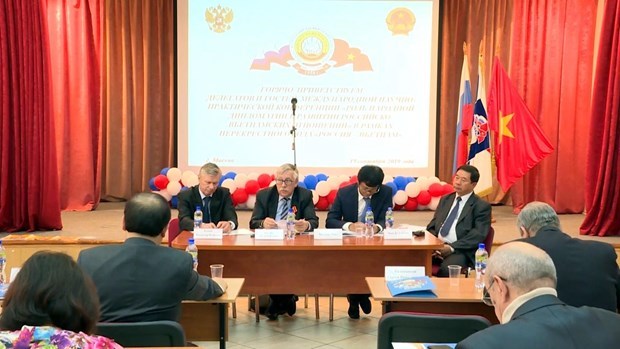 |
|
At the seminar
|
A seminar discussing the role of people-to-people diplomacy in Vietnam – Russia relations took place in Moscow on September 19.
Speaking at the event, Tran Binh Minh, President of the Vietnam-Russia Friendship Association, said the seminar was among activities scheduled during the Vietnam Year in Russia and the Russia Year in Vietnam 2019 for mutual understanding, friendship and cooperation.
He lauded the robust growth of the bilateral comprehensive strategic partnership, adding that his association and its Russian counterpart have been implementing joint plans, including a cooperation agreement for 2015-2020, to contribute to the relations between the two countries.
President of the Russian – Vietnam Friendship Association Vladimir Buyanov highlighted people-to-people diplomacy and public diplomacy as the “soft power” in Russia’s policies for both internal and external relations.
Pointing to the importance of using IT for better communications with the public, he highlighted the need to attract youths’ involvement in such work.
At the seminar, politicians and scholars presented 10 papers on the role of people-to-people diplomacy in consolidating Vietnam – Russia ties and experience in employing people-based diplomatic tools in both nations.
The organizing board said based on these papers, it will make a list of recommendations for submission to leaders of the Vietnamese and Russian foreign ministries.